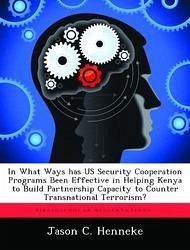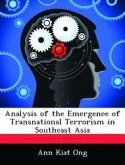This monograph uses Kenya as a case study to analyze the US Security Cooperation role and process in building host-nation capacity to meet the needs of Kenya to counter transnational terrorists' networks. US counterterrorism operations since 9/11 have explicitly demonstrated the US requirement to take an indirect approach to ensuring national security as part of an international community combating transnational terrorists' networks. In addition to capacity building, regional focus from all agencies with the US Government (USG) is required for a coordinated and effective approach in the GWOT. The United States began formal relations with Kenya in 1981 with air and port basing agreements. Kenya's strategic location facilitated access for stability and humanitarian operations in the western Indian Ocean and east Africa. The events of 9/11 highlighted the US requirement for security partners in combating transnational terrorists and Kenya became a central front on the Global War on Terror (GWOT) due to its strategic location and willingness to ally. The partnership that started during the Cold War has carried on through to today's war on transnational terrorists. Kenya is one of the three "anchor states" in sub-Saharan Africa, along with Nigeria and South Africa, essential in stabilizing Africa. The program with Kenya focused on three general lines of effort to include foreign assistance, defense security cooperation and assistance programs, and counter-terrorism training programs. In general, all three have been effective for Kenya. In specifics, the lack of a coordinated regional USG effort reduced the effectiveness of on-going programs to counter the transnational threat in the region. The nature of capacity building and countering terrorism requires a long-term strategy. The requirement to get initial successes in short and mid-term are met through the Defense and Counter-Terrorism efforts. The success in these areas is due to tailoring these programs to the requi








